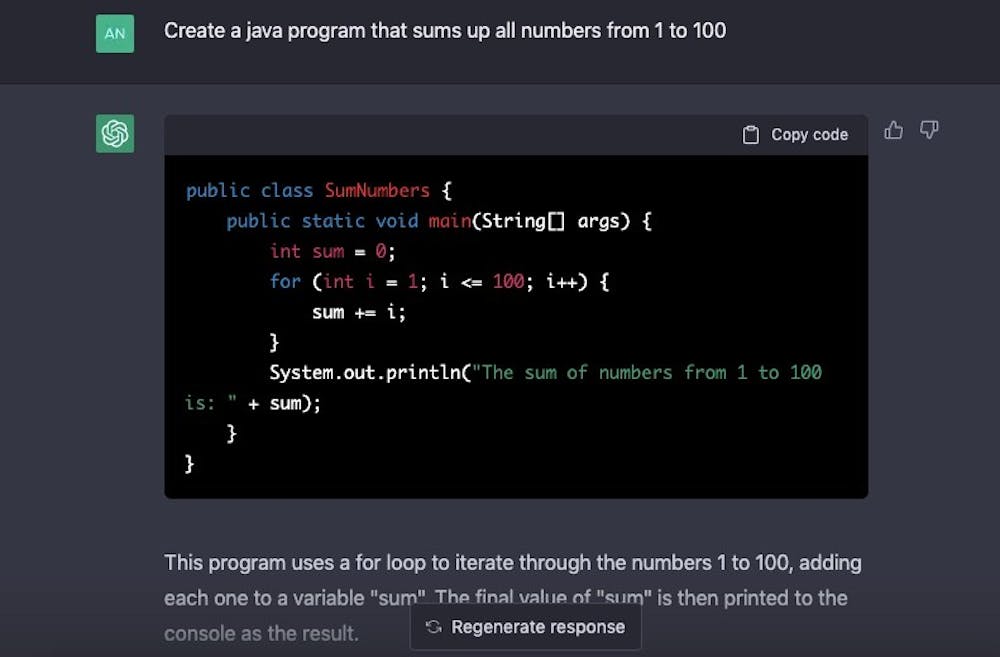ChatGPT, a new artificial intelligence tool capable of generating essays and writing code, is raising concerns about virtually undetectable cheating and changing the way professors give assignments.
ChatGPT is a generative language model that can produce human-like text in response to a prompt, Andrew Bell, technology consultant in the University of Richmond’s Teaching and Scholarship Hub, said.
It is trained on billions of documents on the web, so users can ask it to write in a certain style or re-write any part of a previous response until they are satisfied, Bell said.
The material ChatGPT generates often sounds plausible, but can be inaccurate, Bell said.
ChatGPT could aid students in academic dishonesty if students submit essays they did not write, undergraduate honor council members Brian Pescatore, UR '24, and Christina Currie, UR '25, wrote in an email to The Collegian on Jan. 16.
“The honor code defines cheating as using any resource that was not authorized by your professor,” they wrote. “With that, the use of ChatGPT without the consent of your professor is already considered to be cheating.”
The potential for cheating is especially high because the tools that professors use to detect plagiarism, like Blackboard’s SafeAssign, cannot determine whether a submission was completely or partially generated by artificial intelligence, Bell said.
Joe Essid, professor of English and director of the UR Writing Center, said that he allowed the use of ChatGPT for brainstorming in his classes; however, his students’ writing must be their own.
“I’ve changed my assignments, and I’ve run my assignments through ChatGPT and generated several different essays,” Essid said. “If I see anything close to that from my students, they’re going to the Honor Council. That is unauthorized assistance.”
The Honor Code, which hasn’t been updated since August 2021, was updated on Jan 19, according to an instagram post from the Westhampton College Government Association. The updated honor code explicitly states that unless a professor informs a student that they can use ChatGPT, the software is prohibited from academic use.
On the other hand, some teachers see potential benefits to incorporating artificial intelligence into their curriculum.
Part of Bell’s role is to advise teachers on how to incorporate new technologies into their teaching and scholarship. Professors can use ChatGPT to generate essays that students can critique, examining how it constructs arguments and whether they are effective, he said.
Enjoy what you're reading?
Signup for our newsletter
“We’re still figuring out what its utility is,” Bell said. “As a tool, how can we use it? How can we leverage it to improve learning to improve our teaching, and doing so in a way that supports our students?”
When he asked a class of first-year students whether they had heard of ChatGPT, none had. Yet, Bell expected this to dramatically change in the next few weeks as the tool gains popularity, he said.
While many professors have explicitly forbidden the use of ChatGPT in their syllabi, Joe Hoyle, professor of accounting, explained that his class policy allows the use of ChatGPT in certain situations.
He does not think that ChatGPT is capable of solving new accounting problems, but he is experimenting with allowing the technology so long as students explain how they used it.
“Students must explain to me that they used ChatGPT and claimed responsibility for it. So, if it’s wrong, you’re wrong,” he said.
The rise in artificial intelligence is going to force professors to change their teaching and assignments – for the better, Hoyle said.
Bell believes students who offload their writing to the tool will see their learning suffer. They will not benefit from the learning that assignments are designed to promote, he said.
Outside of the academic sphere, Currie said ChatGPT could be useful for building resumes or sharpening a cover letter.
Essid’s preliminary research indicates that ChatGPT might be a useful tool for English language learners to aid in understanding how they should structure academic papers in the United States, he said.
“It seems to be pretty good about putting vocabulary into context in a way that teaches you more nuances about the words, so I may encourage some of my English language learners to use it when they’re drafting,” Essid said.
Joe Boehman, dean of Richmond College, said that he recognized that ChatGPT is a type of technology that will become increasingly popular as it advances. As a result, universities must determine how to use this technology in an ethical and academically honest way.
“This is something we have to grapple with in the creative process no matter what it is,” he said. “At the end of the day, we’re here because we want you to be creative. We want you to be thoughtful, we want you to use that brain you’ve been given and to develop it.”
Boehman believes it is problematic to allow computers to learn for us. Students are cheating themselves if they allow a computer to think for them, he said.
The technology may drive professors to give assignments that require more critical thinking, Hoyle said.
“I think teachers will have to come up with more innovative assignments,” Hoyle said. “Professors will spend more time thinking about the assignments they want to give that require more complex thinking.”
Contact collegianstories@gmail.com.
Support independent student media
You can make a tax-deductible donation by clicking the button below, which takes you to our secure PayPal account. The page is set up to receive contributions in whatever amount you designate. We look forward to using the money we raise to further our mission of providing honest and accurate information to students, faculty, staff, alumni and others in the general public.
Donate Now



